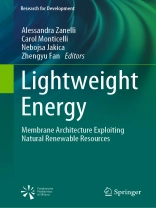This book explores membrane materials as a means of translating natural and renewable resources into a more flexible, dynamic, and reactive architectural skin. It represents the first time that energy-saving design has been addressed systematically in relation to lightweight building systems and tensile membranes. Understanding of the energetic behavior of membranes and foils used as a building envelope is a fundamental theme, as it is the integration of flexible photovoltaics in membranes, as well as the exploitation of water and wind resources. A theoretical, methodological framework for consciously designing the membrane life cycle is presented. The authors cross-cut and combine exploration of climate-based design methodology and life cycle thinking strategies. Both active and passive systems are investigated, referring to alternative productive resources like sun, wind, and water. Case studies are brought forward in the book’s second half, highlighting energy lightness for anincreasingly dematerialized architecture and addressing inherent issues. Four main research and development paths are presented, the first two focusing on advancements in façade materials and Photovoltaic systems applicable to membrane architecture, the third referring to fog and dew harvesting and the fourth dealing with the future frontier of flexible transparency and designs for well-being through a passive solar system.
Cuprins
I PART: Design and Research of Lightweight Energy skins.- 1. Towards the Smart Filter Alessandra Zanelli, Carlotta Mazzola.- 2. Life Cycle Design for Lightweight Skins Carol Monticelli.- 3. Lightweight Environmental Architecture Nebojsa Jakica, Maria Giovanna Di Bitonto.- 4. Flexible Photovoltaic Solar Design Zhengyu Fan, Alessandra Zanelli, Carol Monticelli, Qingxiang Li.- II PART: Applied research projects and experimental developments.- 5. Case study: the SOFT-PV Skin Alessandra Zanelli, Carol Monticelli, Zhengyu Fan.- 6. Case study: the TIFAIN Facade Nebojsa Jakica, Carol Monticelli, Alessandra Zanelli.- 7. Case study: Fog and Dew Net Maria Giovanna Di Bitonto.- 8. Case study: Tempor Active Carlotta Mazzola.
Despre autor
Alessandra Zanelli is Full Professor in the Architecture, Built Environment and Construction Engineering Department at Politecnico di Milano, where she also earned her Master’s Degree Cum Laude in Architecture and her Ph D. in Technologies in Architecture and Environment. Her primary interest is in the role of technological innovation in architecture and industrial design. Since 2015, she has been coordinator of the Textiles Hub, an interdepartmental research laboratory focusing on textiles and polymer materials, as well as the TAN (Textile Architecture Network) departmental unit at her alma mater. She has also, since 2004, been Associate Member of the Tensi Net Association, the thematic network dedicated to upgrading Europe’s built environment through the use of tensile membrane structures, serving as Regional Representative for Italian Universities. She has worked extensively as a partner in projects financed by both regional and international institutions, has been published morethan 220 times and holds four patents.
Carol Monticelli is Associate Professor of the Architectural Technology at Politecnico di Milano, Architecture, Built Environment and Construction Engineering Department, where she also earned her Master’s Degree in Architecture in 2002 and her Ph D. in Technologies for Architecture and Environment in 2006. She also teaches in the School of Architecture, Urban Planning and Construction Engineering. She carries out her research through the joint efforts of the TAN group (Textile Architecture Network) and Textiles Hub, the multidisciplinary reseach lab dedicated to the innovation in technical textiles and polymers. Her main interests at the time of publication have been focused on the design of eco-friendly buildings, the use of innovation in the development of new materials for use in construction and the larger subject of sustainability throughout the construction industry. She coordinates the WG Sustainability & Comfort of the European Tensinet network, she is active member of the WG6 Structural Membranes and WG 18 Environmentally Compatible Structures of the international association IASS. She has authored a number of 136 publications and is co-holder of one patent. She was awarded with the Harting Award for the best paper published in the International Journal Experimental Techniques in 2017, promoted by the Society for Experimental Mechanics SEM, South Carolina, USA.
Nebojsa Jakica is Associate Professor in Façade Design and Engineering at the Southern University of Denmark. His Ph.D. dissertation, “Performance-Based Architectural Design, Simulation and Optimization of Complex BIPV Façades”, addressed the multifunctionality of Building-Integrated Photovoltaics (BIPV), focusing particular attention on the integration of simulations and optimizations in the parametric design processes and tools for achieving Zero Energy Buildings. This dissertation was closely associated with the nationally funded TIFAIN project, as a result of which he co-authored two patents with Prof. Alessandra Zanelli in the field of BIPV. He led the subtask on Design and Modelling of BIPV under International Energy Agency PVPS Task 15 and is a member of multiple international associations dedicated to engineering and architecture, including the EFN, the IASS, and Tensi Net. His architectural work in the private sector includes participation in winning bids in numerous international competitions and projects. He currently leads the SDU FACETS research laboratory that promotes interdisciplinary research and education by exploring the integration of Industry 5.0 technologies in a façade domain with a human-centric approach.
Zhengyu Fan is Associate Professor at Xi’an University of Architecture and Technology. After graduating from Shanghai Tongii University with a degree in civil engineering in 2008, he moved to Italy, where he earned a degree Laude in Architecture at Politecinico di Milano in 2010 and subsequently completed his Ph D. research into “Technology and Design for Environment and Building (TEPEC)”, focusing on the integration of Organic Photovoltaics into Architectural Membranes. Through his research, he has worked with, among other organizations, TIFAIN and TAN (Textile Architecture Network). In addition to his academic work, he has also worked in the private sector as both an architect and an engineer, with an emphasis on researching textile building materials. He is currently a key researcher for a program overseen by the Chinese Ministry of Science and Technology and, in 2017, founded Yuming Renewable Energy Ltd., which seeks to spur entrepreneurship and find ways to apply the research done by TAN within China.












